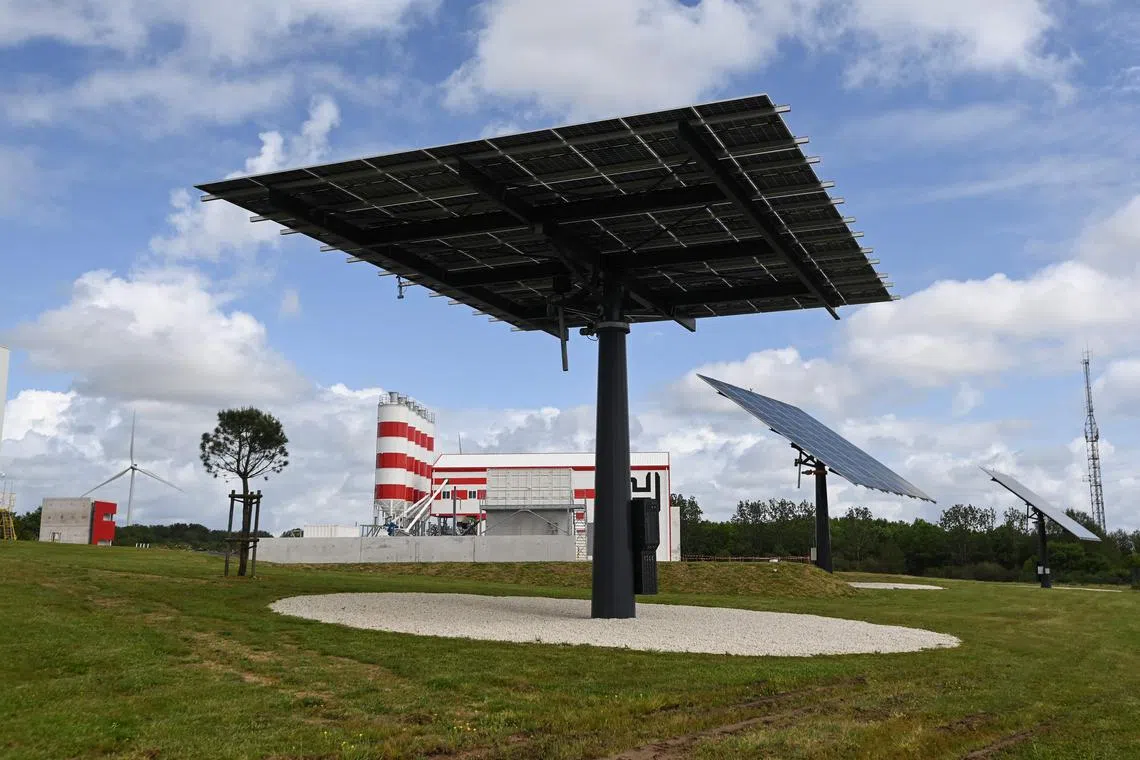Carbon removal forecast to take centre stage at upcoming UN climate change conference
Sign up now: Get ST's newsletters delivered to your inbox

There have been deep divisions among nations over how to combat global warming ahead of the COP28 talks.
PHOTO: AFP
SINGAPORE – Even as the United Arab Emirates (UAE), host of the upcoming United Nations climate change negotiations in Dubai,
Carbon sequestration – which refers to the process of capturing and storing atmospheric carbon dioxide (CO2) – to help avert global warming will be the focus of COP28, said Professor Robert Stavins at the inaugural Albert Winsemius Lecture at the Nanyang Technological University (NTU) last Tuesday.
“It means that there would be renewed attention, I think, to carbon capture and storage, carbon capture and utilisation, also direct carbon removal from the atmosphere which in the UAE is extensive, as well as geoengineering like solar radiation management.
“Now if that happens, it would be controversial,” added Prof Stavins, a Harvard environmental economist, who in the last 15 years has participated in global climate summits.
There have been deep divisions among nations over how to combat global warming ahead of the COP28 talks.
Some wealthy Western governments and climate-afflicted island nations are rallying to phase out fossil fuels, while resource-rich countries like the UAE have campaigned to continue drilling and mining of fossil fuels
But technologies for carbon capture, utilisation and storage (CCUS), which tackle CO2 emissions from power generation and industrial processes that are powered by fossil fuels or biomass, have seen slow progress, noted the International Energy Agency (IEA).
Globally, there are now 35 commercial capture facilities in operation, with none in Singapore.
The combined annual capture capacity of almost 45 million tonnes of CO2 is a mere fraction of the 36.8 billion tonnes produced by the world in 2022.
Plans are in place to develop more CCUS projects, added the IEA.
Since January 2020, more than 10 projects have been announced in Indonesia, Malaysia and Thailand with a total capture capacity of around 15 million tonnes of CO2 annually by 2030.
In the cost-benefit analysis on sequestering carbon naturally by planting trees in forestation efforts, Prof Stavins told The Straits Times: “While biological sequestration of carbon could be more cost-effective than other forms of emission mitigation in many cases, arable land for food production would be sacrificed as trees are planted instead, and this could gradually tip the balance towards increased cost.”
This is as the Ukraine war, now in its second year, has continued to maintain global food prices at levels higher than average,
Companies are also increasingly using carbon credits to offset their emissions, while a country can reach its own emissions reduction targets by funding carbon projects in another country.
But there have been instances where some forest-based carbon projects were criticised for claiming averted emissions when there was no real threat of deforestation.
Having authored the second, third and fifth assessment reports on the Intergovernmental Panel on Climate Change, Prof Stavins highlighted the problem of the quality of carbon credits at a dialogue held at NTU last Wednesday.
“I am extremely sceptical of credits from the forestry sector, because we don’t know that we’re getting anything additional from it, because the comparison is made with a hypothetical of what would have happened otherwise. And that’s an unobserved and unobservable hypothetical. So that’s a problem.”
He cited the example of the European Union being a major purchaser of credits, largely from China and Brazil.
“The EU was therefore getting out of reducing emissions as they otherwise would have, because they had a credit. But it’s not clear that emissions reductions really took place beyond what would have been in those countries,” he said. “In other words, as a result of the credit, you actually had an increase in emissions. So that was very problematic.”
Singapore is home to a World Bank-backed carbon credit data sharing platform


